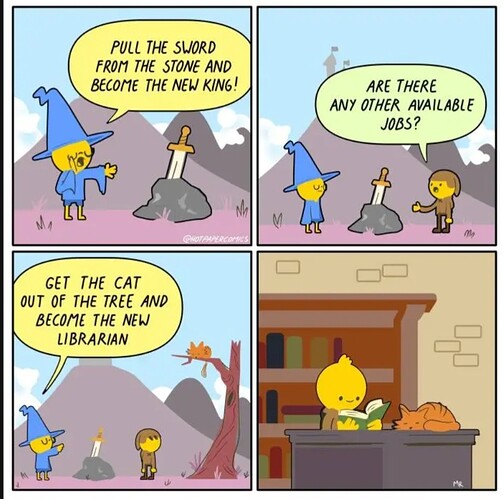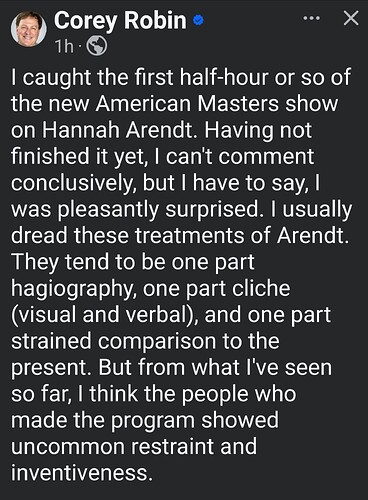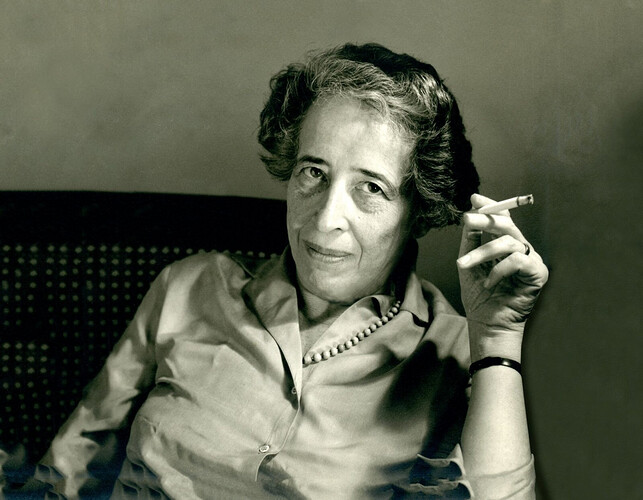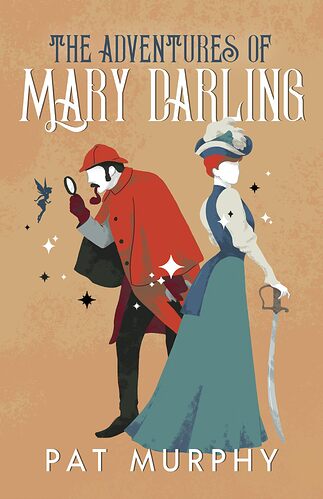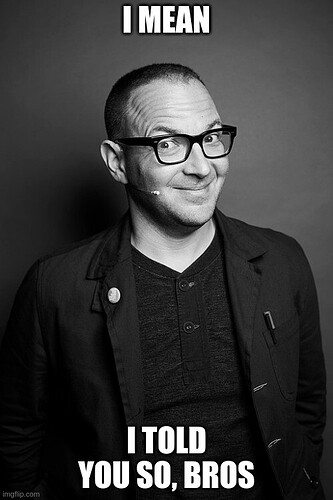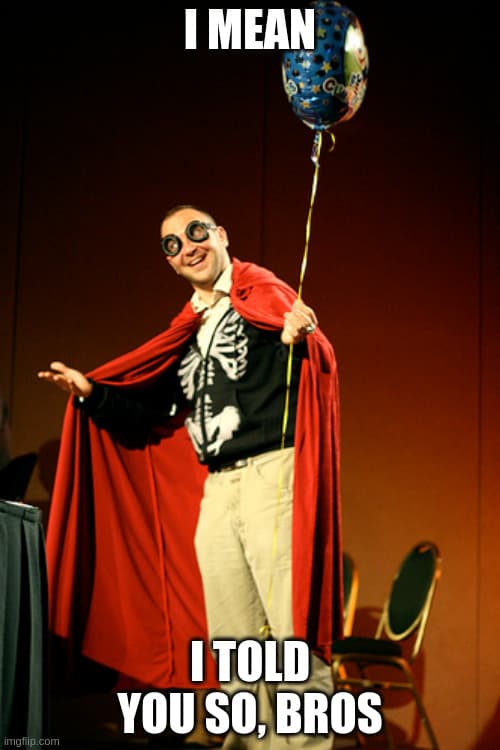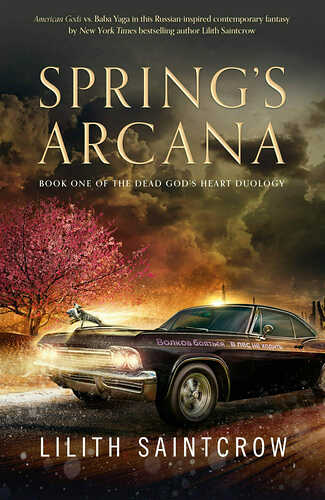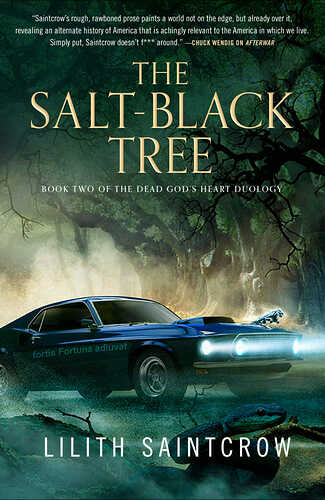Annoying popup avoidance:
I should say at the outset, don’t be put off by the first two image-sounds that appear on the screen: first, a cigarette being lit; second, a typewriter clacking. I immediately thought to myself, oh shit, here we go, the intellectual writer smoking and typing. I don’t know what it is, but particularly when it comes to women writers in the mid-20th century, it’s always the same set of visual cues. Any time a representation of Lillian Hellman or Mary McCarthy or Hannah Arendt appears on the screen, they’re smoking at the typewriter.
That said, I thought the description of Arendt’s early emancipated Jewish milieu in Königsberg was a kind of visual treat. You get a genuine sense of a middle to upper-middle class upbringing. When the program moves to Marburg, where Arendt was a student, the discussion of her affair with Heidegger is really well done, bringing out the peculiar details of his demands on her (join me on a train heading south out of town but sit in the second car behind me, that kind of thing), but also, all the ways in which she was able to extract what she wanted and needed from him. And then the transition of her move to Berlin, which was in high Weimar mode of the mid to late 1920s. A little too much shades of Babylon Berlin, but it captures, visually, the combination of extremity and celebration of the era. For each segment—Königsberg, Marburg, Berlin—you get a real sense of place and the person she was in that place.
I was extraordinarily impressed by two of the commentators—Lyndsey Stonebridge and Kathleen Jones—who really know what it is to talk biographically about a writer like Arendt. More than details, quirky and banal, they provide a sense of story to her life, bringing Arendt to life in a way that that movie about her, which came out a few years ago, completely fails to do.
It also helps that the incomparable Nina Hoss, easily my favorite actress working today, does all the voiceovers of Arendt.
One last thing: the centrality of Hans Jonas as a voice in the discussion, particularly during their Marburg years. It really adds a dimension that’s not often brought out so clearly as it is here, namely, their status as Jewish outsiders in the academic world.
Wait, one more thing: The parallels with today. Again, this is what I dread most in these productions. The inevitable incantations of Origins of Totalitarianism read against visuals of Trump or whoever. But in this case, so far, I was struck by something quite different. In the discussion of the Jews of Königsberg and then the Jews of Berlin, the producers subtly make the point that many of these Jews, though of course not all, were newcomers and immigrants to Germany, having fled not only antisemitic pogroms (Arendt’s great grandfather was one such refugee) but also and more important desperate poverty. The Jews of Germany get recast here not as part of some ancient theological or cultural scapegoat but as new immigrant arrivals in a war-torn industrial power and then a faltering economy. I was impressed by the delicate echo the producers were going for.
Oh, that sounds excellent…
I will say, about the smoking/typewriter thing… Yeah, it’s a bit of a cliche, but for a reason. Everyone used to smoke (not everyone, but you know, it was far more common) and writers wrote on typewriters… so it makes sense, I guess.
I see what you mean but I guess for me, it doesn’t make sense, if what you’re trying to do is present a captivating portrait of a unique individual, instead of immediately shoehorning them into the same cliched box as other people get shoehorned into because they did a similar kind of work in a similar era. If you’re trying to present a portrait that shows what’s unique and captivating about an individual, why start out with the same tired set of cliched visual cues?
Yeah, very true…
Could be that the director believed it was not nearly as played out as we might find it? I guess one of the most well-known pictures of her was her with a cigarette… Could also just be as simple as the director likes that imagery, too.
But it sounds like they did not stay grounded in cliches. Like the point about Jewish people being generally speaking immigrants to German cities is kind of interesting.

Cory Doctorow had a review of this book up on his site a few months ago. My library hold came available today and I’ve already read it for 3 hours. The temptation to stay up and finish is very strong, but I must resist! I have things to do tomorrow.
However, there is hope.
The Big Five are not the only ones capable of publishing books. Small presses, with their miniscule budgets, have kept literary fiction on life support. They take the creative risks that the Big Five won’t, and they nurture and sustain writers’ careers in a way the Big Five no longer cares to. If you enjoyed James by Percival Everett (published to great fanfare this year by Big Five imprint Doubleday), thank the small press Graywolf who doggedly published Everett for decades before the Big Five finally decided to cash in on him.
The reader’s challenge now is to look beyond the Big Five’s mediocrity machine. This is not easy, considering how many imprints the Big Five holds, but it is possible. Readers are not just static consumers. If we choose which writers we want to read, we can also choose which publishers we want to buy from—and can recognize that, at this moment in time, the Big Five and the small presses are driven by entirely different incentives.
Literature, and literary fiction, is art, and art is unkillable. But literary culture can much more easily be destroyed. Today, the Big Five have the deepest pockets but lack the agility, chutzpah, and possibly even desire to act as guardians of high literature. Small presses such as Akashic, Two Dollar Radio, Short Flight/Long Drive and many others are filling that gap, notwithstanding their more limited budgets. In the end, it falls to readers to recognize what is happening and to seek out books from publishers that are genuinely interested in transcendent, creative work.
It’s coming for ALL the creative industries! It’s too bad far too many people just… don’t seem to give a shit about anything anymore.
Exactly!
I only ever really listen to him when he wears his cape.
The goggles are optional, though.
Finally got around to reading Night at the Circus by Angela Carter. It’s a tall tale that just keeps doubling down on its own absurdity, totally revealing in unfettered magical realism. It tells the story of Fevvers, a winged woman (or is she?) who performs in a traveling circus, and Jack Walser, a journalist who becomes enamored with her. Recommended.
The figure engraved on this medallion was that of a pardon my French member, sir, of the
male variety; that is, a phallus, in the condition known in heraldry as rampant, and there were
little wings attached to the ballocks thereof, which caught my eye immediately. Around the shaft
of this virile member twined the stem of a rose whose bloom nestled somewhat coyly at the place
where the foreskin folded back. Whether the thing was ancient or modern I could not tell, but it
represented a heavy investment.
If you liked American Gods, you might enjoy this duology I read recently:
Nat Drozdova is desperate to save a life. Doctors can do little for her cancer-ridden mother, who insists there is only one cure―and that Nat must visit a skyscraper in Manhattan to get it.
Amid a snow-locked city, inside a sleek glass-walled office, Nat makes her plea and is whisked into a terrifying new world. For the skyscraper holds a hungry winter goddess who has the power to cure her mother…if Nat finds a stolen object of great power.
Now Nat must travel with a razor-wielding assassin across an American continent brimming with terror, wonder, and hungry divinities with every reason to consume a young woman. For her ailing mother is indeed suffering no ordinary illness, and Nat Drozdova is no ordinary girl. Blood calls to blood, magic to magic, and a daughter may indeed save what she loves…
…if it doesn’t consume her first.
This is the way to the Dead God’s Heart.
Nat Drozdova has crossed half the continent in search of the stolen Dead God’s Heart, the only thing powerful enough to trade for her beautiful, voracious, dying mother’s life. Yet now she knows the secret of her own birth―and that she’s been lied to all her young life.
The road to the Heart ends at the Salt-Black Tree, but to find it Nat must pay a deadly price. Pursued by mouthless shadows hungry for the blood of new divinity as well as the razor-wielding god of thieves, Nat is on her own. Her journey leads through a wilderness of gods old and new, across a country as restless as its mortal inhabitants, and it’s too late to back out now.
Blood may not always prevail. Magic might not always work. And the young Drozdova is faced with an impossible choice: Save her mother’s very existence…
…or accept the consequences of her own.
Lilith Saintcrow is always good for an enjoyable read, IMHO, and these books are no exception. While they’re clearly inspired by American Gods, they forge their own path through mythologies and literary legends, as Nat finds a way to deal with her complicated relationship with her mother and struggles to figure out who she wants to be. (Slight spoiler: there’s no physical abuse, but Nat was raised ignorant of her true heritage for a very dark reason.)
And I hope it has inspired you to read all the other books in her catalogue that you may have missed? I loved her so much. Taken far too young. I may have enjoyed her next (sadly last) novel Wise Children even more than Nights.
I’m currently reading some Dashiel Hammet novels but I realised that I hadn’t read the second book in Pat Barkers Troy books when the third came out last year. I have brought it home to read. The connection? She always credits Angela Carter as her mentor and the person who gave her the confidence to publish.
She is also amazing.
The Women of Troy doesn’t have a wiki page but the first does.
This seem interesting…
I’m no good at, and hate, interviews. But here’s one I feel I could do with ease:
Do you like Hemingway?
No.
You’re in!
I do like Highsmith.
The Myth of the Wrong Body
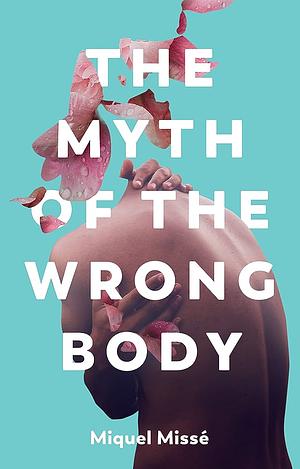
The author is a Spanish trans activist who has stepped on a few toes of other trans people in the past, due to the battles he chooses. It was written only a few years ago, when it seemed like trans visibility and mainstream acceptance were seriously building up. But it strikes me as really the wrong book for the USA in 2025.
I agree with the author on several points:
- Trans pathologization and transmedicalism are problematic.
- There should be no external pressure to medically transition.
- Judging trans folks by how well they pass is a shitty thing to do.
- A few trans celebrities, beauty queens, cartoon characters and a handful of trans politicians are not adequate representation.
- The utopian solution to a lot of what’s wrong in our society is a combination of radical body acceptance, and dismantling gender essentialism / the gender binary. (And probably, ending capitalism.)
I think though, that the author just isn’t reading the room. Granted, the room changed in the last 2-3 years, and some of the things he is fighting against are now transphobes’ favorite battlegrounds – if you squint it kind of looks like he’s on the wrong side. He is worried about puberty blockers for minors, for instance, thinking they might set up unrealistic expectations of the results of transition. (But he’s 100% in favor of supporting kids’ gender identities.)
He’s also been involved with radical activism that he admits was too disconnected from the trans community as a whole – and I’m not sure he’s learned enough from that, in terms of tone, language and chosen battles. It might just be an unfortunate translation, but the book often uses the word “transgenderism” which in English is almost solely the domain of transphobes trying to discredit “gender ideology.” Woof.
My thought is… the root cause of dysphoria probably is society. I like the “I wasn’t born in the wrong body, I was born in the wrong society” line. But it is easier and faster to change a body than to change society, and it does make a lot of people happier. Don’t force it, but don’t get in the way either.
Anyone have a recommendation for a book on Irish mythology that is either focused on or contains information on Abhartach/Avartagh?
A friend is having a hyper focus issue on the topic and needs a book asap ![]()
